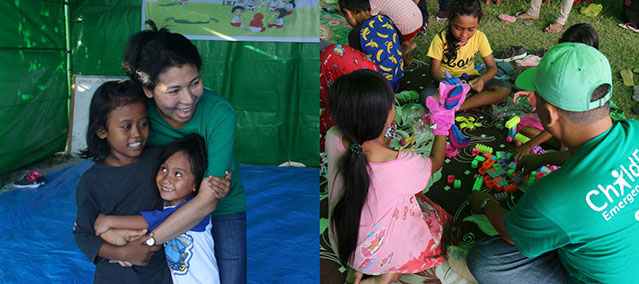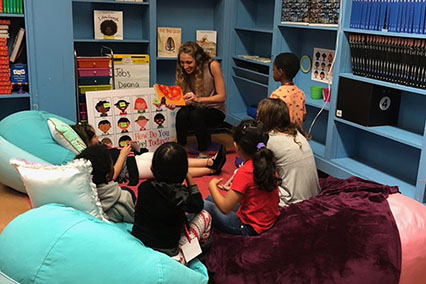Site will be
unavailable for maintenance from June. 4, 11:30 p.m., to June 5, 12:30 a.m. ET. Thank you for your
patience!
Kids and coronavirus: 5 ways to help children stress less in stressful times
Posted on 04/14/2020
By Alys Matthews, contributing writer for ChildFund





Your heart races, and your muscles grow tense. You can hardly eat anything (or maybe you’re eating everything). Worst-case scenarios play tag in your brain.
Sound familiar? What’s happening in the world right now has never happened before – at least not in our lifetimes – and the profound feelings of stress we’re experiencing as a result are as about as contagious as the coronavirus itself. That goes for children too. While it’s true that COVID-19 doesn’t appear to impact children as severely as adults, kids aren’t immune to our anxiety about our collective future. As a mom myself, I wish they were.
The good news is that, while we can’t protect children completely from fear and worry (and, to be honest, we shouldn’t be trying to), there’s a lot we can do to help them build confidence in themselves and resilience to stressful situations.
ChildFund has worked to serve children in emergencies, and those undergoing intense emotional trauma, for more than 80 years, so we have a lot of experience in this field. Here are our top five ways to help children stress less and thrive, even in an unpredictable world.
1. Offer emotional support to soothe kids and coronavirus fears.

ChildFund emergency response staff play with children at a Child-Centered Space
that was established after the earthquake that struck Central Sulawesi, Indonesia, in September 2018.
Play is crucial to a child’s recovery from a stressful situation.
One of a child’s greatest needs is a sense of stability. So when the news on TV is alarming, the adults around them seem uneasy, and every aspect of their lives has been disrupted – especially ones they enjoy, like extracurricular activities and playing with friends – it’s completely normal for them to feel scared, confused, sad, aloof or angry. Especially if you’re one of the many working Americans adjusting to the new job title of stay-at-home parent following the closure of schools and child care centers, you’re probably finding yourself with a lot of extra time to witness these roller-coaster emotions firsthand – and that might make you feel completely overwhelmed.
Even if a child doesn’t seem too emotionally affected, make sure you take time to check in with them on a regular basis. This needn’t be an overt “How are you feeling?” so much as some quality time together doing something the child enjoys. Are they a sports kid? Get outside and kick a ball around. Do they love art? Paint together. (Art can be a powerful therapeutic tool!) Even if you don’t live in the same household as the child you care about, you can read a story or watch a movie together virtually, thanks to modern technology. Show them that you’re interested in the things they are, and you’ll find natural opportunities to take their emotional temperature and provide some comfort. Remember: Every child is grieving the loss of normalcy in their own way, just like the grown-ups. What they need now more than anything is your presence, patience and love.
2. Share the facts about kids and coronavirus.

In Sierra Leone, Alice, 10, washes her hands using a bucket and soap ChildFund
delivered to help prevent the spread of COVID-19 in vulnerable communities.
Depending on the child’s age, they might have many questions about COVID-19 and all the upheaval it’s causing. Address these honestly and with as much factual information as possible. Resist the urge to downplay the seriousness of the disease; resist also the urge to make nonstop jokes about the end of the world, especially around younger children. Keep an open dialogue about what’s going on and encourage kids not to believe every rumor they read on the internet or hear from their friends.
Kids need to know the facts about what’s happening, including the more life-affirming realities: for example, the fact that most people who get sick with COVID-19 recover, especially kids. Now is a great opportunity to discuss and drive home the importance of good hygiene habits like coughing and sneezing into a tissue or their elbow, not sharing food and drinks, avoiding touching their face, and, most importantly, frequent handwashing. If they’re having trouble with the full 20 seconds or otherwise just need some inspiration, bookmark this video and play it when the faucet turns on. (Take it from the mom of a 3-year-old who thinks washing his hands is pure torture: Catchy music helps!)
3. Find opportunities to connect.

A member from ChildFund’s local partner organization in Richmond, Virginia,
reads a book at a weekly story time session that helps children facing personal
challenges work through their emotions – a key part of our programs in the
United States. Creating a comfortable, predictable space to connect on a
regular basis can help children feel safe and cared for.
For at least an hour each day, turn off the news, put the phone away and play. Or do chores together, for that matter. Research shows that regardless of the activity, interpersonal connection is the antidote to childhood stress.
Of course, this is always easier said than done in emergency situations, when normal routines have been upended. If you’re juggling working from home, filling out unemployment applications or trying to find odd jobs in addition to caring for a family, you might feel yourself slipping into a kind of gray fog in which days blur together and there’s never enough time for anything. It can help to make up new routines and stick to them, including a special block of time each day where you come together as a family and connect. This can look like anything: a board game or puzzle, story time, cooking a favorite meal. My son and I just started a veggie garden together. I love that I’m teaching him about how plants grow, and he loves making a mess in the dirt!
4. Practice self-care.

Scenes from a ChildFund “psychosocial first aid” session for teachers in Mindanao, Philippines,
after an earthquake destroyed homes, schools and livelihoods there in October 2019.
The session brought 200 teachers together to share stories of loss, support each other and practice
mindfulness exercises to help them beat stress. As the teachers learned to cope with their own
emotions, they found strength to help the kids in their care do the same.
Remember the old adage about putting your own mask on first? That’s important right now (literally and figuratively). Despite what you may have heard, self-care is not always about luxurious bubble baths, hot-stone massages and chocolate (although those are great too!). Rather, self-care means prioritizing your own physical, mental and emotional well-being above all your other daily demands. And it’s far from selfish. Kids need your example so they can learn how to care for themselves.
When we’re in crisis mode, it’s easy to not always make the healthiest choices, so self-care is both particularly difficult and particularly necessary. Eat nutritious food, get plenty of physical exercise (outside, if possible – sunshine is sanity’s best friend), take breaks and do lots of little things that you enjoy, even if that’s just catching up on a favorite TV show. Most importantly, offer yourself plenty of grace at this difficult time. You don’t have to be the perfect parent or grandparent, the perfect employee or the perfect picture of calm right now. You just need to manage your stress in healthy ways. When you’re taking good care of yourself, you’ll be surprised at how intuitively you find ways to help children stress less, too.
5. Instill gratitude in kids, and coronavirus – and other stressors – won’t feel so overwhelming.

Patricia, 6, shares a laugh with her grandma at their home in rural Uganda.
This is the first time many children in the U.S. have experienced things like supply shortages (“Mom, why isn’t there any toilet paper at the grocery store?”), social isolation and the inability to go to school – things that kids in the developing world are often already used to. It’s hard for children not to focus on what they’ve lost. But one amazing thing about hard times is their startling ability to wake us up to the good things in our lives we weren’t paying attention to.
Now is an excellent time to encourage kids (and yourself!) to think and talk about what you’re grateful for. And we don’t mean guilting kids into eating their veggies by talking about starving children: We mean providing real opportunities for your child to reflect on what they love and appreciate about life, or even to connect with a child whose day-to-day reality is much different than theirs. Start a gratitude journal in which a child can write or draw a picture every day of something she’s thankful for: bubbles, video games, the dog. Or make a donation as a family to help children facing hunger during the COVID-19 crisis. Take advantage of the opportunity to teach your kids that when people help each other, everyone is better off.
Stress is no cake walk, especially when we’re talking about something as all-encompassing as a global pandemic. But the fact that we’re feeling so much of it all around the world points to one undeniable truth: We’re in this together. Keep that hopeful undertone in mind as you brainstorm your own ways to help children stress less. These dark days may very well be the most fertile ground we’ve ever had for growing deeper connections with kids. And coronavirus might just have an unexpected side effect on all of us, no matter how old we are: a kinder, more compassionate world.
Loading...


